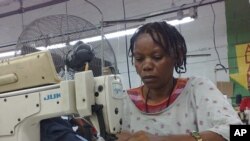Some Haitian businesses are slowly reopening, as managers assess what facilities remain intact after the devastating January 12 earthquake.
The sewing machines are humming again inside a warehouse belonging to Island Apparel. Piles of gray and blue fabric have been cut into pant legs and wait to be sewn into finished pieces. An employee scoops up pieces from one workstation and delivers it to another, where sewing machine operators attach the pockets.
Gude Loeagus has spent more than two years working at the factory, which makes employee uniforms for the U.S.-based firm Cintas. He said it is a good sign of solidarity that so many people are back at work, even though he says many are struggling mentally.
Loeagus says the devastation of the earthquake has left him scared and in shock, but he came to work to earn money for his family.
Before the quake, the factory employed about 130 people, but only 97 were back when it reopened on Monday. Island Apparel's office manager Evens Juste says some have left the capital to escape the devastation, and others are unaccounted for since the quake.
Juste says the factory was able to resume work so quickly because many employees were eager to return to their jobs.
He says employees would come to the factory every day since the earthquake to see when it would reopen.
Island Apparel was fortunate to escape the devastation caused by the January 12 quake. Nearby buildings in the industrial park have been totally leveled. The owner of one damaged company was struggling to find jobs for his employees at another site that was intact. In the meantime, he told workers to prepare food baskets to give out in Cite Soleil, where most of the employees live.
Gertha Jezulien lost her house in Cite Soleil and everything she owns when the quake hit. She managed to come to work at Island Apparel, but seeing the damaged buildings and the deep cracks in many others makes her ill at ease.
Jezulien says she is cautious about going into buildings, and any jolt or aftershock frightens her.
For some, returning to work offers a break from the current state of life in a broken city. Scores of Haitians living in tents have little to do, except to wait for deliveries of water and food aid that seldom come.
Clothes manufacturing has become a key export for Haiti in recent years, partly due to a set of U.S. tax breaks signed in 2006. The task of helping more factories to resume operations may be crucial to rebuilding the economy as Haiti struggles to recover from the quake.
Haitian Businesses Slowly Reopen in Quake Rubble




